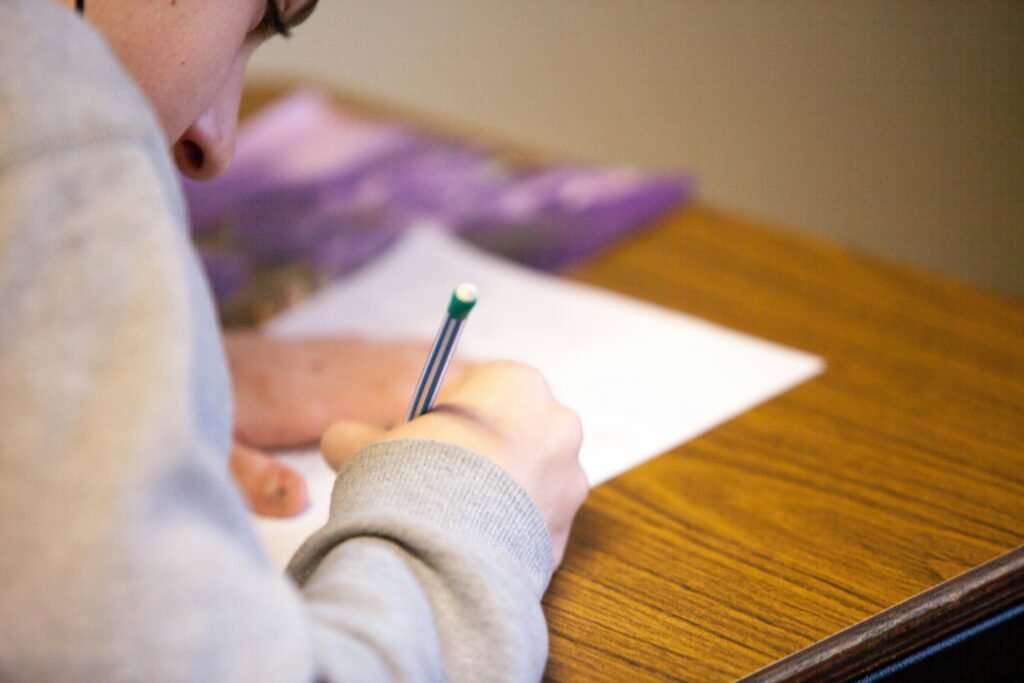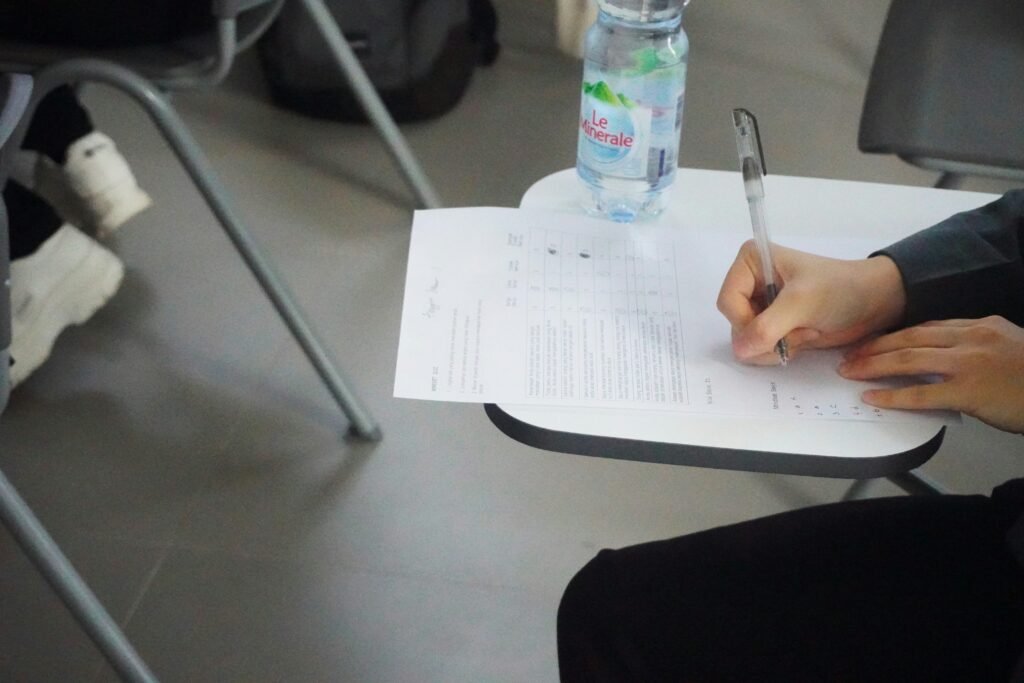Are you preparing for the SAT exam and need some SAT tips to help you improve your scores? If you want to refine your study habits and boost your test-taking skills, this blog post is for you. From effective study techniques to practical advice on managing stress, you’ll find lots of valuable guidance below. Let’s dive in!
What Is The SAT?

The SAT is an entrance exam used by most colleges and universities to make admissions decisions. The SAT is a multiple-choice, computer-based test that was created and is administered by the College Board.
The purpose of the SAT is to measure a high school student’s readiness for college and provide colleges with one common data point that can be used to compare all applicants. College admissions officers will review standardized test scores alongside your high school GPA, the classes you took in high school, letters of recommendation from teachers or mentors, extracurricular activities, admissions interviews, and personal essays. How important SAT scores are in the college application varies from school to school.
The higher you score on the SAT and/or ACT, the more options for attending and paying for college will be available to you.
Structure Of The SAT

The new (digital) SAT comprises two sections: Reading and Writing and Math. Students have 64 minutes to complete the Reading and Writing section and 70 minutes to complete the Math section for 2 hours and 14 minutes.
Structure and Breaks in SAT Sections
Each section is divided into 2 equal-length modules, and there is a 10-minute break between the Reading and Writing section and the Math section. The first module of each section contains a broad mix of easy, medium, and hard questions. Based on how students perform on the first module, the second question module will be either more difficult or less difficult.
Question Format and Time Allocation on the SAT
Compared to the ACT, the SAT provides 68% more time per question. Most of the questions are multiple-choice, though some math questions ask you to enter the answer rather than select it. There’s no penalty for guessing on all questions: if you’re unsure of the answer, it’s better to guess than leave the response blank.
Write, Study, And Research 10x Faster For Free With Conch AI
Studying new material isn’t easy but tedious, time-consuming, and repetitive. Conch steps in so you can focus on learning. With Conch, you can upload your course material (Upload class notes, documents, lectures, videos, and more) and generate studysets live (Record your lectures, meetings, presentations, or interviews to watch notes and flashcards generate live).
Ensuring Undetectable AI-Assisted Essay Writing
At Conch, we guarantee that there’s a 99.99% that you won’t get caught after using our tool. If you use ConchAI to write your essays you will be undetected by algorithms like GPTZero and TurnItIn. With Conch, you can write your essays 10x faster, AI detection-free. Our tool helps you add citations, it helps you rewrite content so that it’s undetectable by AI, and so much more, all to protect students’ time and let them focus on actually learning the content!
Popularity Among Students and Its Growing User Base
So Chegg users, High School and college students, and anyone writing papers, use Conch to make your student life easier and bypass AI detection tools with ease. Conch has over +1 million users to date and growing.
Sign up and use Conch’s AI Essay writer and Study for free for free today.
Related Reading
What Is A Good SAT Score?

A good SAT score is one that helps you get admitted to a college that you want to go to. The average SAT score is around 1050. Any score above that would be above average. A score of 1350 would put you in the top 10% of test takers and help make your application competitive at more selective schools. In choosing colleges to apply to, consider factors such as the cost of tuition availability of financial aid, location, and campus atmosphere.
Setting Your Target SAT Score Based on College Interests
Also, consider whether the college offers academic and extracurricular programs that interest you. To set your target SAT score, first explore a range of colleges that can offer you the mix of things you want. Then, look at the average SAT score for an admitted first-year student and use that as your target.
Utilizing BigFuture for Comprehensive College Research and Admissions Insight
The College Board college planning website BigFuture contains all of this information and is an excellent resource for researching colleges. Note that your SAT score is only one factor among several on your application. Your grades, application essays, and extracurriculars also shape admissions officers’ perceptions of your application.
15 Best SAT Study Tips To Prep For The Test

1. Starting Early
Begin Your SAT Preparation at Least Three to Six Months Before the Test Date
When it comes to studying for the SAT, starting early is key. Begin your preparation at least three to six months before your test date. This extended timeline allows you to cover all necessary topics, avoid last-minute cramming, and reduce stress.
By starting early, you can absorb the material more thoroughly, leaving room for review and practice. Breaking down your study plan into weekly and monthly goals is crucial to ensure steady progress.
2. Take Practice Tests
Regularly taking full-length practice tests is one of the most effective ways to prepare for the SAT. These tests help you get used to the actual exam’s format, timing, and pressure. Start with a diagnostic test to establish your baseline score and analyze your results to identify areas of improvement. Additional practice tests every few weeks can help you track your progress and adjust your study plan accordingly. Make sure to simulate testing conditions by timing yourself and working in a quiet environment. The College Board offers several full-length practice tests available for free in Bluebook™.
3. Identify Weaknesses
After Each Practice Test, Spend Time Reviewing Incorrect Answers
After each practice test, review your incorrect answers to identify patterns in your mistakes. Focus on understanding why you got a question wrong and learn the underlying concepts. Prioritize studying your weakest areas, whether specific math topics, reading comprehension, or grammar rules.
This targeted approach ensures that you are improving where it’s most needed. Using the same login information you used in Bluebook, go to mypractice.collegeboard.org and review the questions you answered incorrectly, along with the explanation of the correct answer. Doing this lets you focus on the types of questions and skills you need to practice most.
4. Create a Study Schedule
Creating a well-structured study schedule helps you stay organized and accountable. Divide your study time into manageable daily or weekly sessions and allocate specific time slots for different sections of the SAT, such as math, reading, and writing.
Include regular review sessions to reinforce what you’ve learned. It’s essential to be realistic with your schedule and balance study time with schoolwork and extracurricular activities.
5. Use Quality Study Materials
Investing in high-quality SAT study guides and materials can significantly improve your preparation. The College Board’s Official SAT Study Guide is an excellent starting point, including real SAT questions and detailed explanations. Resources like Khan Academy offer free, personalized SAT practice. Reputable publishers like Princeton Review and Kaplan also provide comprehensive prep books and practice tests.
6. Focus on Vocabulary
A robust vocabulary is crucial for the reading and writing sections of the SAT. Compile a list of SAT-specific vocabulary words from study guides and online resources. Use flashcards or apps like Quizlet to practice regularly. Incorporate new words into your everyday conversations and writing to reinforce your learning. Understanding word roots, prefixes, and suffixes can also help you decipher unfamiliar words on the test.
7. Practice Math Regularly
Consistent math practice helps you master the various topics covered on the SAT, including algebra, geometry, and data analysis. Work on a mix of problem types and difficulty levels to build confidence and proficiency. Familiarize yourself with the formulas and concepts you’ll need. Use practice books, online resources, and math apps to diversify your study methods. Don’t just focus on solving problems; ensure you understand the underlying principles.
8. Read Actively
Improve your reading comprehension skills by reading challenging texts, such as articles from reputable newspapers, scientific journals, and classic literature. Practice active reading by summarizing passages, noting key points, and questioning the author’s purpose and arguments. Discuss what you read with peers or teachers to deepen your understanding. This practice will help you navigate the complex reading passages on the SAT more effectively.
9. Learn Test Strategies
Familiarize yourself with specific test-taking strategies for the SAT. Learn how to eliminate incorrect answer choices quickly, guess strategically when unsure, and manage your time effectively during the test. For example, answer easier questions first and mark difficult ones for later review. Understanding the common traps and question patterns can also give you an edge.
10. Review Basic Grammar Rules
The writing and language section tests your command of English grammar and usage. Review basic grammar rules, including subject-verb agreement, punctuation, verb tenses, and sentence structure. Practice editing and revising sentences and passages. Use grammar workbooks and online resources to reinforce these skills. Understanding the common grammar errors tested on the SAT can help you quickly identify and correct them.
11. Take Notes and Review
As you study, take detailed notes on key concepts, formulas, strategies, and vocabulary. Organize your notes by section and topic for easy reference. Regularly review your notes to reinforce your understanding and retention. Summarizing information in your own words can help solidify your knowledge. Use your notes to create quick reference sheets for last-minute review before practice tests and the actual exam.
12. Use Online Resources
Leverage free online resources to supplement your study materials. Websites like Khan Academy offer tailored SAT practice exercises based on your strengths and weaknesses. Join online forums and study groups to discuss problems and share strategies with other students. Educational platforms like Coursera and Udemy may also offer SAT prep courses. These resources provide additional practice questions, instructional videos, and interactive tools to enhance your preparation.
13. Stay Healthy
Maintaining a healthy lifestyle is essential for optimal brain function and effective studying. Ensure you get adequate sleep, aiming for 7-9 hours per night. Eat a balanced diet of fruits, vegetables, proteins, and whole grains to fuel your body and mind. Exercise regularly to reduce stress and improve concentration. Hydrate well and take regular breaks during study sessions to avoid burnout.
14. Practice Time Management
Effective time management during the SAT is crucial for completing all sections within the allotted time. During practice tests, time yourself for each section to develop a pacing strategy. Practice answering questions more quickly without sacrificing accuracy. Learn to move on from particularly difficult questions and return to them if time permits. Familiarize yourself with the test’s structure and timing to reduce anxiety and improve efficiency on test day.
15. Stay Positive and Motivated
Maintaining a positive attitude throughout your SAT preparation is vital. Set realistic goals and reward yourself for meeting milestones to stay motivated. Surround yourself with supportive friends, family, and mentors who encourage your efforts. Visualize your success and remind yourself of the long-term benefits of performing well on the SAT. Practice stress-relief techniques such as deep breathing, meditation, or yoga to stay calm and focused.
How Long Should You Study For The SAT?

Before starting your SAT preparation, you must determine when to take the test. With general college application timelines, most students aim to take their first SAT in the fall of their junior year. That way, you can retake the SAT in springtime for a higher score. This will free up a lot of space in your senior year, where you will focus on college applications.
Should You Study for Two Months or Five?
You can choose between an intense study schedule or a more measured one. A fierce study schedule might look like ten hours a week for two months, while a more measured one might be four hours a week for five months. These methods can work and help increase your score dramatically, so your SAT study plan usually depends on your schedule and study style.
The Minimum Number of Months to Study
Remember that the minimum number of months recommended to study for the SAT is three months. So, keep this the minimum study time before taking the SAT. However, if this isn’t possible, it is possible to prepare with less than three months of prep adequately.
Related Reading
- How To Study For The Sat
- Sat Reading Tips
- Sat Essay Prompts
- Sat English Tips
- How To Ace The Sat
- Digital Sat Tips
- Sat Math Topics
- Good Sat Score Range
- Sat Math Tips
- Sat Math Formulas
- Sat Math Section
- Sat Writing Tips
- Sat Vocabulary Flashcard
- Sat Reading And Writing
- Sat Grammar Tips
- Ai Sat Prep
- Sat Essay Tips
- Last Minute SAT Tips
- SAT Tips and Tricks
Best 7 SAT Tips For Test Day

1. Get a Good Night’s Sleep
I cannot overstate the importance of a good night’s sleep the night before the SAT. Trust me, you don’t want to be drowsy or foggy during this critical test. Lack of sleep can lead to slower processing speeds and cognitive impairments, harming your performance. The best advice? Aim for 7-9 hours of rest. Set a consistent schedule, avoid caffeine, and engage in relaxing activities before bed.
2. Eat a Healthy Breakfast
Nourish your body with a hearty breakfast on the morning of the test. A balanced meal can help you maintain focus and energy levels throughout the exam. Focus on protein, complex carbs, and healthy fats. Avoid sugary foods and drinks that can cause energy crashes.
3. Arrive Early and Prepared
Getting to the test center with time to spare can make a difference. Aim to arrive at least 30 minutes before the test starts. This way, you can settle in, find your room, and handle any last-minute issues. Ensure you’ve packed all the essential items you’ll need, such as your admission ticket, ID, pencils, calculator, watch, and snacks.
4. Manage Your Time Wisely
Time management is key to finishing all sections of the SAT. Get a feel for the timing of each section and practice pacing during your prep. On test day, watch the clock but don’t panic. If you get stuck, move on and come back if there’s time.
5. Stay Calm and Focused
Nerves are normal, but keeping calm can help you perform at your best. Try deep breathing to ease anxiety. Take short breaks during the test to reset if you feel overwhelmed. It’s just a test, and you’re well-prepared.
6. Read Instructions Carefully
Even if you’re a pro at practice tests, read all instructions carefully on test day. Each section has unique directions, and missing them can cost you points. Pay attention to instructions at the beginning of each section and for individual questions.
7. Use Your Breaks Wisely
The SAT includes breaks for a reason. Use this time to your advantage; stretch, move around, have a snack, and hydrate. Take the opportunity to reset and prep yourself for the next section.
Complete Step-by-Step Guide on How To Use Conch AI To Ace Your Classes (Efficient Writing, Studying, Note Taking, and More!)
Do You Have Any Questions?
Discovered a major bug or experiencing an issue, or need help using a certain feature, shoot as an email.
Write, Study, And Research 10x Faster For Free With Conch AI
Studying new material isn’t easy but tedious, time-consuming, and repetitive. Conch steps in so you can focus on learning. With Conch, you can upload your course material (Upload class notes, documents, lectures, videos, and more) and generate studysets live (Record your lectures, meetings, presentations, or interviews to watch notes and flashcards generate live).
Determining Your Target SAT Score Based on College Programs and Averages
At Conch, we guarantee that there’s a 99.99% that you won’t get caught after using our tool. If you use ConchAI to write your essays you will be undetected by algorithms like GPTZero and TurnItIn. With Conch, you can write your essays 10x faster, AI detection-free. Our tool helps you add citations, it helps you rewrite content so that it’s undetectable by AI, and so much more, all to protect students’ time and let them focus on actually learning the content!
Utilizing BigFuture for Comprehensive College Research and Admissions Factors
So Chegg users, High School and college students, and anyone writing papers, use Conch to make your student life easier and bypass AI detection tools with ease. Conch has over +1 million users to date and growing.
Sign up and use Conch’s AI Essay writer and Study for free for free today.

Leave a Reply